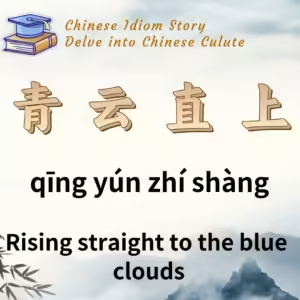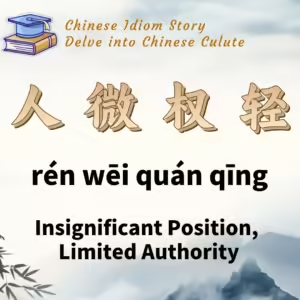
Chinese Idiom: 青云直上 (Qing Yun Zhi Shang)
English Translation: Rising straight to the blue clouds
pīn yīn: qīng yún zhí shàng
Idiom Meaning: This idiom is used to describe someone whose status or career rises rapidly, often due to good fortune or personal achievement. It implies a swift and significant promotion or advancement.
Historical Source: Records of the Grand Historian (《史记》) by Sima Qian, from the chapter Biographies of Fan Ju and Cai Ze (《范雎蔡泽列传》).
Idiom Story:
During the Warring States period, Fan Ju was a talented but low-ranking man from the state of Wei. He worked as a retainer for a higher official named Xu Jia. On one occasion, Xu Jia took Fan Ju along on a diplomatic mission to the state of Qi. Xu Jia, suspecting that Fan Ju had secret dealings with Qi, reported him to the prime minister of Wei, Wei Qi. Without investigation, Wei Qi ordered Fan Ju to be beaten severely, leaving him for dead in a public toilet.
Fan Ju, miraculously surviving the ordeal, was saved by a sympathetic jailer and a friend, Zheng Anping. He fled to the state of Qin, assuming the name Zhang Lu. In Qin, Fan Ju’s talents were recognized, and he rose to the high position of prime minister under King Zhao of Qin.
Years later, Qin was preparing to attack Wei, and Xu Jia was sent to Qin on a mission to negotiate peace. When Xu Jia arrived in Qin, he encountered Fan Ju, who was now dressed in rags and pretended to be poor. Fan Ju deceived Xu Jia into believing he was a lowly servant and even accepted gifts from Xu Jia. Eventually, Fan Ju revealed his true identity as Zhang Lu, the powerful prime minister of Qin. Shocked, Xu Jia humbly knelt before Fan Ju and said, “I did not expect that you would rise to the blue clouds” (“贾不意君能自致于青云之上”). Fan Ju spared his life but sent Xu Jia back to Wei with a message demanding the surrender of Wei Qi or face Qin’s invasion.
From this story, the phrase “青云直上” evolved, symbolizing a rapid ascent to a high position or status.






